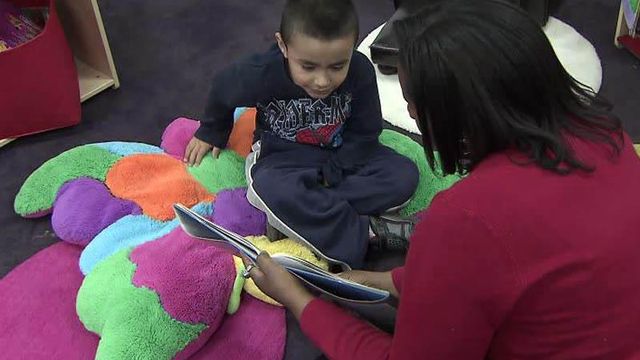Issue of NC poverty, need at forefront of pre-K debate
A legislative committee on Thursday backed away from proposals to tighten up eligibility for pre-kindergarten programs and privatize some early childhood education.
Posted — UpdatedThe House Select Committee on Early Childhood Education Improvement had issued a draft report last week calling for limiting eligibility for pre-K classes to children whose families are at or below the federal government's poverty guideline, which is an annual income of $22,000 for a family of four.
Under current state guidelines, a 4-year-old is considered "at risk" if the child's family makes less than $51,000 a year.
Education advocates complained that the change would deny 30,000 children access to pre-K programs, and dozens of parents and teachers let lawmakers know they weren't pleased with the idea.
On Thursday, the committee said the state needs to establish guidelines for pre-K eligibility that best target children who need the services.
"This is just the beginning of what I hope will be a very long dialog as we move to improve early childhood education, to look at at-risk factors and to make sure we're doing what we need to do to help those kids who are truly at-risk," committee Co-Chairman Justin Burr said.
The committee also backed off a suggestion that North Carolina pre-K programs be privatized, choosing instead to call for a range of public and private settings for programs.
The hearing prompted Rep. George Cleveland, R-Onslow, to ask that the phrase "extreme poverty" be removed from the committee's final report.
According to the U.S. Census Bureau, North Carolina has the 11th-highest poverty rate in the nation, with about one-sixth of the state's population earning less than the federal benchmark. Census statistics show that a quarter of the children statewide live in poverty, and that number is growing.
"We have no one in the state of North Carolina living in extreme poverty," Cleveland said, defining the condition as living on $1.50 a day.
The Census Bureau defines extreme, or deep, poverty as a family of four living on no more than $11,000 a year. Nearly 750,000 North Carolinians meet that standard, including one in 10 children.
"Over the years, they keep redefining poverty to make sure we have a poverty class," Cleveland said. "I have a problem when we say we have an increasing number of children living in extreme poverty. It’s a government agency perpetuating what they want as a poverty level."
Burr, R-Stanly, quickly distanced himself from Cleveland's comments, saying many North Carolinians do live in poverty and that the state should help them.
Cleveland maintained that he was comparing U.S. poverty to third-world standards, but Louisa Warren, senior policy advocate for the left-leaning North Carolina Budget & Tax Center, said that level of poverty is nothing to aspire to.
"I think we're all glad that we aren't a third-world country in the United States," Warren said.
Rep. Pat McElraft, R-Carteret, said the state ought to look at ways other than living in poverty to determine which children are eligible for pre-K programs.
"I don't think poverty is our only criteria. In fact, I don't think it's the main criteria, to tell the truth, for these children being at-risk," McElraft said.
Warren disagreed, but she said the debate is a chance to highlight poverty in North Carolina.
"(Poverty) is the No. 1 factor that predicts whether children are set up to succeed in school," she said. "We need to use evidence and research to have that conversation rather than gut feelings."
About 67,000 children statewide are eligible for pre-K classes each year, but funding provides enough space for only 24,700.
Superior Court Judge Howard Manning ruled last year that the state has a constitutional duty to provide pre-K classes to all at-risk 4-year-olds. Republican legislative leaders have appealed Manning's ruling, and they reduced funding for pre-K programs in this year's state budget.
Gov. Beverly Perdue said last week that she has found enough unused federal grant money to open an extra 2,000 slots in pre-K classrooms across North Carolina.
On Thursday, the governor said she was pleased that lawmakers were re-thinking the idea of limiting access.
“Expanding access to early childhood education is the right thing to do for North Carolina's working families. Not only did a North Carolina judge rule that the state is under a constitutional obligation to provide (pre-kindergarten) to all eligible, at-risk 4-year-olds, but a mountain of research clearly demonstrates that this proven program provides real benefit to the lives of children," Perdue said in a statement.
• Credits
Copyright 2024 by Capitol Broadcasting Company. All rights reserved. This material may not be published, broadcast, rewritten or redistributed.






